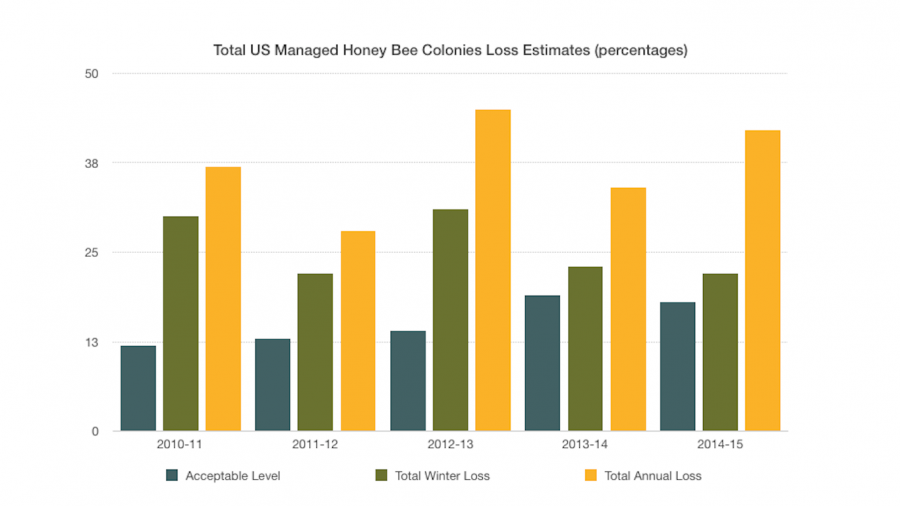Save The Bees
November 9, 2017
Over the past few years, the media has helped boost the “Save the Bees” epidemic. There is a stigma around bees that they are malicious insects that are out to sting everyone. Contrary to popular belief, bees are here to benefit us, they don’t want to sting us.
There are 25,000 different species of bees in the world, but only about 4,000 in the U.S. According to a study found by One Green Planet, in 2010, these bees produced $19 billion worth of crops in the U.S., while the pollinator animals produced $10 billion combined, which is almost half the amount of what bees made.
Not only do bees help pollinate crops, they also keep the earth an aesthetically pleasing place. The beautiful flowers we see in gardens and fields look as stunning as they do due to them being pollinated.
We need bees to be able to keep our ecosystem running smoothly, yet we take them for granted, all because they have a stinger that they use for their own protection.
Without bees, we would lose 1/3rd of our crops. These crops maintain of healthy foods such as blueberries, watermelon, cherries, apples, cranberries, pumpkins, and so much more. According to Sweet Mountain Farm, 50% of the U.S population purchase honey on its own, and 15% eat foods with honey flavor. All these different types of foods are not only able to be eaten on their own, but they are also valuable in many different recipes.
Not only would we lose some of our favorite foods, we’d also lose money. In an effort to keep these crops around, we would have to help pollinate in a less efficient, but expensive way.
Even with all these downsides, the bee population is still declining. In the time span between 2006 and 2012, we have lost 31.1% of commercial hives, which typically contain up to 100,000 bees each.
Some may wonder: why are so many bees disappearing? Well, due to unregulated transport of bees, they are obtaining a disease called Varroa, which can severely damage the wings of honeybees. Without flight, they cannot pollinate the plants as quickly and efficiently. Also, because of their struggle to fly, they cannot collect nectar to create honey as often as they need to, which means beekeepers have to attempt to feed them themselves.
How can we help stop this epidemic? It’s simple, just make it easier for the bees. Stop using pesticides with neonicotinoids, for it will give bees a gut parasite called Nosema. Plant bee-friendly flowers like lavender, white clovers, etc. (this even includes weeds) leave a fresh basin of water outside, but do not use artificial sugars to help flavor the water for them.
We can also help the bees by helping the beekeepers! Find a local farmer’s market and and purchase raw honey to support the beekeepers. Learn as much as possible about beekeepers and what they do. We can even notify our congress about our concern about the unregulated transport.
One of the biggest things that we have to remember, is that wasps and bees are two different things. Wasps are carnivorous, and are willing to sting you for your food and drinks. Bees won’t hurt you unless they feel threatened. In fact, bees are vegetarian, and if one ever lands on you, it isn’t a threat. “Stay still and calm if a bee is around you or lands on you. Many bees will land on you and sniff you out. They can smell the pheromones that come with fear and anger it can be a trigger for them to sting you,” says an unnamed journalist from Queen of the Sun. Unless bees feel threatened, they will not harm you.
It is time to remove the stigma from bees and help them do their job in the environment. It is detrimental that the bees get taken care of. Keep spreading awareness about the bees and help fix a problem that we are apart of.



